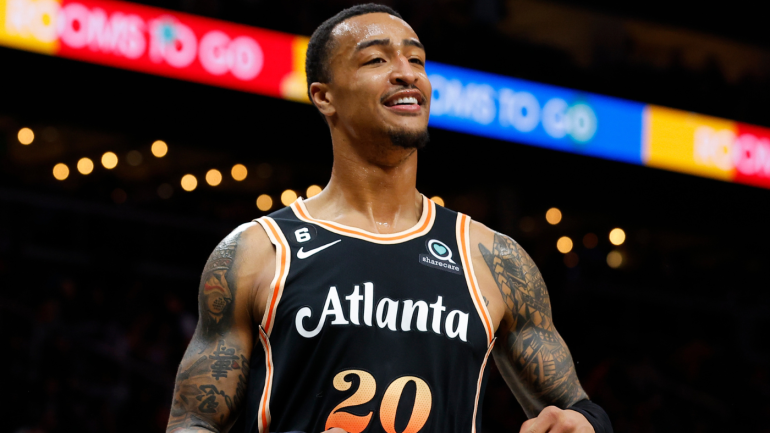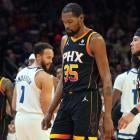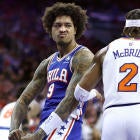
The Atlanta Hawks have finally traded John Collins on Monday, reportedly sending him to the Utah Jazz in exchange for Rudy Gay -- who exercised his $6.4 million player option for the 2023-24 season as part of the deal, and a -- future second-round pick, per ESPN. Collins has lived in trade rumors over the past few years, but the Hawks' previous front office, led by Travis Schlenk, never pulled the trigger as it waited on a more attractive deal that never came.
So now Collins is a straight-up salary dump to a team that has the cap space to absorb the some $78M he has remaining on his contract.
It works pretty perfectly. The Hawks need to cut salary. The Jazz are in position to take it on. Let's grade the trade.
Atlanta Hawks: B+
As far as Collins had fallen in Atlanta, becoming a nearly invisible part of the offense and a sub-30% 3-point shooter, this is, through one lens, still a tough deal to swallow. This is a guy who averaged over 21 points and 10 rebounds on 40% 3-point shooting a year before Atlanta signed him to a five-year, $125M deal in 2021.
To get, in the immediacy, nothing but cap relief for a player that once figured as either as a core piece of a young and emerging contender or a valuable trade chip is rough. But that's not all Atlanta got here. It also gets a huge $25M trade exception. That's probably the biggest part of this deal for either side.
Atlanta did what it had to do here. In a league that, under the new CBA, is about to make life hell on big spenders, the Hawks, who will reportedly remain active in trying to upgrade the roster, get under the tax (for now) and generate meaningful flexibility as they look ahead to the possibilities of re-signing Dejounte Murray, Onyeka Okongwu and Saddiq Bey as well as acquiring potentially bigger fish via the trade market.
While Collins, as mentioned above, is due $78M over the next three years (26.6M player option in 2025-26), Gay will make just $6.4M this season before coming off the books. Atlanta did well to work with a team in Utah that could facilitate a salary dump with cap space without having to take equal salary back.
Bottom line: The deal Atlanta wanted for Collins never came. This became probably the best of what had become a limited basket options for a high-dollar negative contract in an increasingly belt-tightening time. It's too much to give the deal an 'A' because the Hawks, albeit under a different front office, should've had the foresight to trade Collins a few years ago when there was a chance at a decent return.
But as it got later and Collins depreciated more and more, to trade him for another player or players who would likely be on the books for multiple years, under the guise of a short-term slingshot into contention, would've been a Band-aid at best. This rips the Collins' Band-aid off for a fresh financial start. Necessary move for the Hawks.
Utah Jazz: B+
You can just see Danny Ainge on the phone saying, "You're going to give me Collins for THAT?" OK, sure. Send him over. You can talk about Collins as a declining player, but at least some of that was situational in Atlanta and he'll only be 26 when the season starts.
The Jazz aren't in a rush. They have a wheelbarrow of draft picks after the Donovan Mitchell and Rudy Gobert trades. They have cap space. Kicking the tires on Collins is pretty much all upside.
It remains a question whether they Jazz will bring back Jordan Clarkson and/or Talen Horton-Tucker, both of whom will likely opt out to become free agents; if they don't they can still have north of $20M in space even with Collins' money on the books.
Utah can build with patience while still making an honest run at the playoffs in the short term. The Jazz were in the hunt last season until they strategically dropped out. Utah will start a huge, talented frontline in seven-footers Lauri Markkanen and Walker Kessler along with Collins. Add in Ochai Agbaji and No. 9 overall pick Taylor Hendricks and you're talking about an average of 7-foot wingspans.
Keyonte George, who is the potential point guard of the future, is super long as well for his 6-foot-4 frame. Utah is going big, and Collins as an upside starter or an established, super-athletic bench guy if Hendricks looks ready early is pretty damn intriguing.
I can't give the deal an 'A' for the simple fact that Collins is still making a lot of money, and he could be on the books for three more years. If he keeps declining, it won't be great. But Utah is in a prime position to absorb that kind of financial loss without really hindering its ability to put a winner (relatively speaking at this point in the rebuild) on the floor.






















